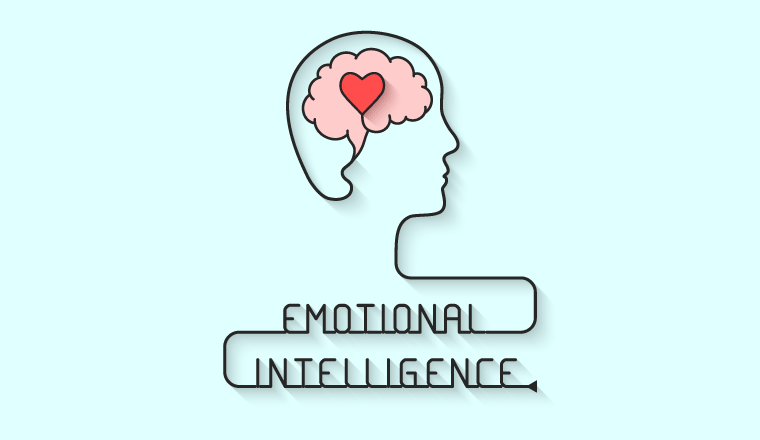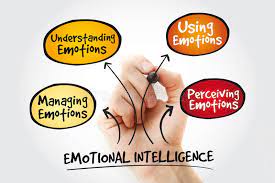Emotional intelligence is a critical skill that helps us understand and manage our emotions and the emotions of others.
And the best part? It’s a very easy skill to learn.
What Is Emotional Intelligence?
So, when you hear emotional intelligence, what comes to mind?
Emotional intelligence is the ability to identify and label emotions accurately. To understand how emotions influence thoughts and behaviours. It also involves empathy, or the ability to recognize and understand the emotions of others, and to respond appropriately to those emotions.
However, it has little to do with being overly emotional in tense situations.
Emotional intelligence is a critical skill that helps us build strong relationships, communicate effectively, and navigate the challenges of daily life with adaptability.
Related: Types of Intelligence
Types Of Emotional Intelligence

Several models for understanding emotional intelligence exist, and some models recognize different types of emotional intelligence. Here are three commonly recognized types of emotional intelligence:
Personal Emotional Intelligence
This type of emotional intelligence focuses on self-awareness, self-regulation, and self-motivation. What does that mean? It means understanding one’s own emotions, recognizing how emotions influence behavior and decision-making, and managing emotions effectively to achieve personal goals.
Interpersonal Emotional Intelligence
This type of emotional intelligence focuses on social awareness and relationship management. It involves recognizing and understanding the emotions of others, empathizing with their perspectives and needs, communicating effectively, and building strong relationships based on trust and mutual understanding.
Situational Emotional Intelligence
This type of emotional intelligence focuses on adapting emotional responses to different situations. It involves recognizing and responding appropriately to different emotional cues and contexts, adapting communication and behavior to meet the needs of the situation, and managing emotions effectively in response to changing circumstances.
Related: The Different Male Personality Types
Other models of emotional intelligence may recognize different types or components of emotional intelligence, but these three are commonly recognized as important aspects of emotional intelligence that contribute to success in personal and professional life.
How Do You Build Emotional Intelligence?
Not by being ignorant, that’s for sure.

Emotional intelligence can be developed and maintained with practice and effort. Here are some ways to build emotional intelligence:
Practice self-awareness
This is the first step in building emotional intelligence. Pay attention to your own emotions, thoughts, and behaviors, and try to understand how they are interconnected. This can involve keeping a journal, meditating, or practicing mindfulness to increase your awareness of your own emotional states.
Cultivate empathy
Empathy is a key component of emotional intelligence, and it involves recognizing and understanding the emotions of others. You can develop empathy by actively listening to others, putting yourself in their shoes, and practicing compassion and understanding.
Improve communication skills
Effective communication is essential for building strong relationships and managing conflicts. You can improve your communication skills by practicing active listening, expressing your emotions and needs clearly and assertively, and avoiding judgment and criticism.
Practice emotional regulation
Emotional regulation involves managing your own emotions effectively. This can involve techniques like deep breathing, visualization, and mindfulness to calm yourself down when you are feeling stressed or overwhelmed.
Seek feedback
Ask for feedback from others about how you come across and how you can improve your emotional intelligence. Be open to constructive criticism and be willing to make changes based on feedback.
Learn from others
Observe others who have strong emotional intelligence, such as mentors or colleagues, and learn from their example. Identify the behaviors and strategies they use to manage their own emotions and connect with others, and try to emulate those behaviors in your own life.
Related: How To Increase Your IQ
5 Ways To Know If You’re Emotionally Intelligent

In today’s fast-paced and stressful world, emotional intelligence is becoming increasingly important. Here are 5 ways to know if you’re emotionally intelligent:
You’re Self Aware
Of all the 5 ways to know if you’re emotionally intelligent, the key component is self-awareness. If you’re emotionally intelligent, you have a good understanding of your own emotions and how they affect your thoughts and behaviors. You are in tune with your feelings, and you can recognize when you are experiencing a certain emotion.
This self-awareness enables you to manage your emotions effectively and avoid being controlled by them.
You’re Empathetic
Empathy is another important aspect of emotional intelligence. It involves the ability to recognize and understand the emotions of others. If you’re emotionally intelligent, you can put yourself in someone else’s shoes and see things from their perspective.
This enables you to connect with others on a deeper level and build stronger relationships.
You’re a Good Communicator
Effective communication is essential for building strong relationships and managing conflicts. If you’re emotionally intelligent, you have excellent communication skills. You can express your emotions and needs clearly and effectively, and you are also able to listen actively and empathetically.
This enables you to build strong, positive relationships with others.
Related: 9 Ways Reading Makes You Smarter
You’re Resilient
Life is full of challenges and setbacks, and emotional intelligence helps you cope with them effectively. If you’re emotionally intelligent, you have resilience, which is the ability to bounce back from adversity.
You are able to manage your emotions and stay positive in the face of adversity, and you also have the ability to adapt to change and find new opportunities.
You’re Open-Minded
Being open-minded is an important part of emotional intelligence. If you’re emotionally intelligent, you are open to new ideas and perspectives. You don’t judge others based on their emotions or opinions, and you are willing to listen to and consider different viewpoints.
This enables you to connect with a wide range of people and build strong relationships based on mutual respect and understanding.
Related: Work-life Balance: What It Is, and How to Improve It
Books That Improve Emotional Intelligence
Many excellent resources are available for learning about emotional intelligence and developing your skills in this area. You might find these helpful. If not, perhaps you need more than just the emotional kind of intelligence.
- “Emotional Intelligence 2.0” by Travis Bradberry and Jean Greaves: This book provides a practical guide to developing emotional intelligence skills, with a focus on self-awareness, self-management, social awareness, and relationship management.
- “Working with Emotional Intelligence” by Daniel Goleman: This book explores the importance of emotional intelligence in the workplace and provides strategies for developing emotional intelligence skills.
- “The EQ Edge: Emotional Intelligence and Your Success” by Steven J. Stein and Howard E. Book: This book provides a comprehensive overview of emotional intelligence, including self-awareness, self-regulation, empathy, and social skills, and provides practical tips for developing these skills.
- “The Language of Emotional Intelligence: The Five Essential Tools for Building Powerful and Effective Relationships” by Jeanne Segal – This book focuses on the importance of communication skills in building emotional intelligence, with a focus on empathy, assertiveness, and effective listening.
- The Consortium for Research on Emotional Intelligence in Organizations (www.eiconsortium.org): This website provides a wealth of resources on emotional intelligence, including research articles, assessment tools, and training materials.
A Final Remark From BattaBox
In conclusion, emotional intelligence is an essential skill that can help you succeed in all areas of life. Now you have learned the 5 ways to know if you’re emotionally intelligent. By working on your emotional intelligence, you can improve your relationships, manage your emotions effectively, and achieve your goals.
If you have any comments, please let us know.
